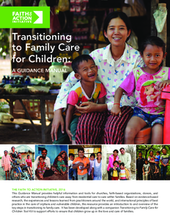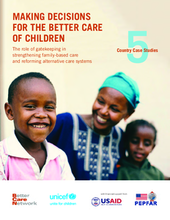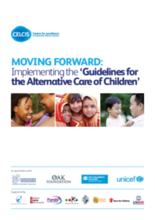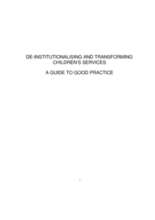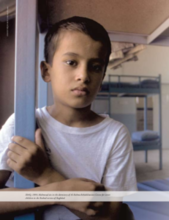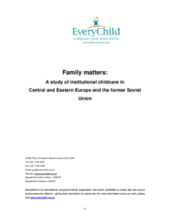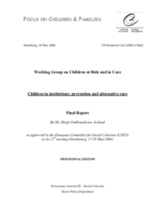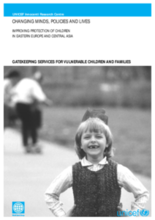This section provides guidance on the process of deinstitutionalization with instruction on gathering support, designing alternative care, transferring resources, and supporting family based care.
Displaying 1 - 10 of 12
The Transitioning to Family Care for Children Tool Kit is an online resource developed by the Faith to Action Initiative for churches, faith-based organizations, donors, and others seeking to transition their care and support of children away from a residential model of care (e.g., institutions, orphanages, children’s homes, group homes) to care within families.
Transitioning to Family Care for Children: A Guidance Manual aims to provide practical guidance and tools for churches, faith-based organizations, donors, and others who are transitioning care for children away from residential care to care within families.
Published jointly with UNICEF, this new BCN Working Paper focuses on the role of gatekeeping in strengthening family-based care and reforming alternative care systems. This Working Paper reviews different approaches to gatekeeping in five countries--Brazil, Bulgaria, Indonesia, Moldova, and Rwanda--to consider what has and has not worked, to analyze lessons learned from practice, and to reflect on the implications for improving policy and programs in this area.
This handbook, Moving Forward: Implementation of the ‘Guidelines for the Alternative Care of Children,’ is aimed at legislators, policy-makers and decision-makers, as well as professionals and care providers, to support the implementation of the Guidelines for the Alternative Care of Children, endorsed by the United Nations General Assembly in 2009. It explains the key thrusts of the Guidelines, outlines the kind of policy responses required, and describes ‘promising’ examples of efforts already made to apply them in diverse communities, countries, regions and cultures.
This folder contains guidance and planning and assessment tools to implement reform of national social care financing from institutionalized care to a family and community-based framework.
Comprehensive manual on the theory and process of deinstitutionalization based on the experiences of childcare professionals across the European region.
This is a chapter from the United Nations Secretary-General’s Study on Violence Against Children that specifically explores the factors contributing to violence against children in institutional care and justice institutions. This chapter includes sections on the sources of violence against children in institutional care, the impact of institutional care on children’s health and development, and the populations of children most likely to become institutionalized.
A report discussing the advent and perpetuation of institutional care in Central and Eastern Europe and the Former Soviet Union prior to and since the end of the communist regime. It also provides examples of family-based care as models of care to substitute institutional care and offers recommendations to donors, NGOs and governments for child care reform based on their experience in CEE and FSU.
A comparative analysis of protection and care systems across Europe, focusing on the use of institutions, alternative forms of care placements, family support services, and the role of social workers in the process of child placement.
A 2 part document containing a concept paper on strategies that divert children from institutional care into community based support programs, and a toolkit with practical resources for implementing improved gate keeping.

